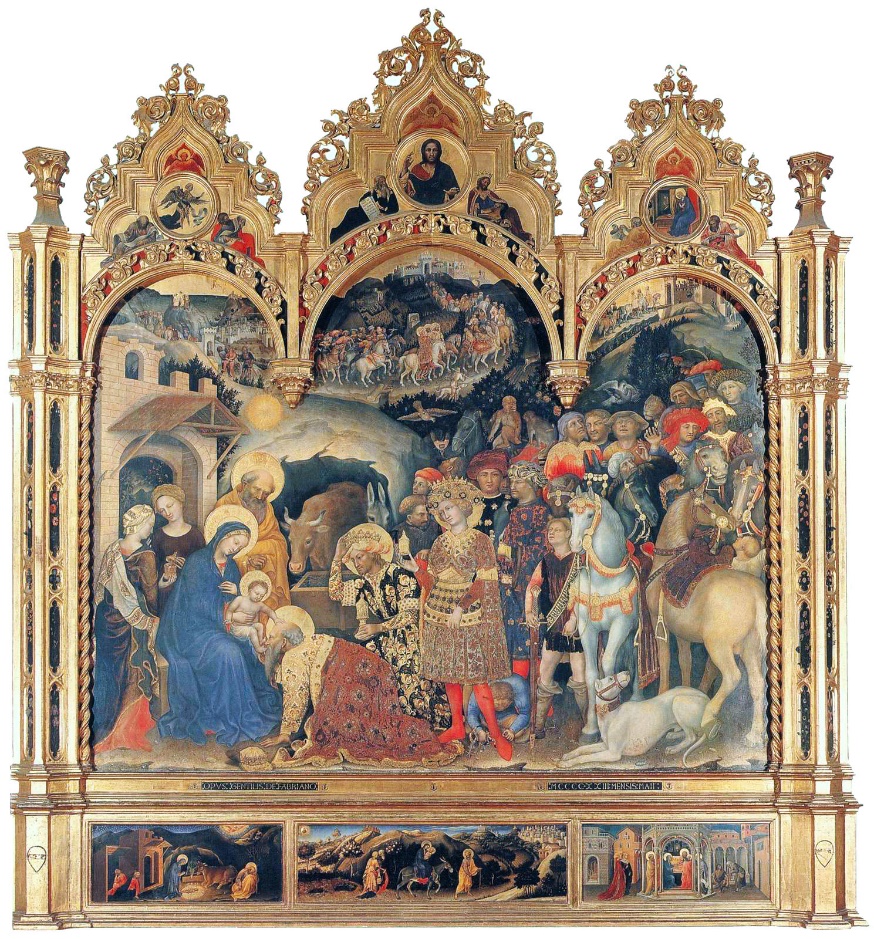
The title of the artwork is “Adoration of the Magi”; Gentile da Fabriano created it in the 1423 year. The first impression of the work was the mystery and a clear connection with religious overtones. In real life, this picture plays with light due to the presence of silver and gold so that the impressions could be slightly different, but it is difficult to understand what this picture is about right away (Leinwandmalerei 988). Its elegant figures are dressed in velvets and expensive embroideries, and the Magi are accompanied by Oriental attendants who care for exotic creatures such as lions and camels. Its outstanding linearity and brilliant hues heighten the impression of rich exoticism. The decorativeness of its exquisite, courtly style influenced Florentine painters throughout the period, providing a counterpoint to Masaccio’s stark naturalism.
The art installation represents many gospel traditions about Christ’s birth as they were recounted during the Middle Ages and Renaissance. Palla Strozzi, a Florentine aristocrat, and lover of the arts, purchased the painting upon the creator’s entrance into the city. Palla spent several hundred florins for the high altar, which is around six times the average wage of a competent craftsman. In the panelboard, three Magi, wise men, and rulers thought to come from mysterious eastern realms, bring gifts to the freshly born Christ child. It is an altarpiece, which is an artwork such as a painting, sculpture, or carving portraying a religious theme designed for a location at the rear of or behind a Christian faith’s sanctuary.
The Adoration of the Magi, also known as the Adoration of the Kings, is a theme in the Birth of Jesus shown in artwork in which three Magi, depicted as monarchs, find Jesus by following a light and place presents of gold, frankincense, and honey before him and adore him. Gentile used the Magi’s trek to show off his artistic inventiveness and physical skill. The monarchs do not wear archaic attire, as one might anticipate from a biblical account, but innovative garments are made to appear wealthy and slightly strange. The royal entourage is bursting at the seams with a wide range of figure kinds, beautifully patterned embroideries, and unusual animals. The foreground characters are virtually layered on top of one another, as though the earth is pushed forward to fit as many persons as possible into a small area.
Gentile’s art installation displayed the amount of wealth his patron could afford to spend and the type of artist he could engage. Palla’s honed appreciation for the innovative and audacious was also on show. The Adoration praised nature in a manner that few paintings had before, despite its seeming focus on wealth and worldly prestige. People, animals, and their actions are all monitored closely. The pillars that surround the frame appear to be bursting with flowers. The trim panels beneath the major picture are considerably more inventive in depicting many types of illumination.
“The Nativity” is defined as a night scene with various sources of light, including the miraculous illumination flowing from the little Christ Child, the intensity of the angel presenting to farmers in the background, and the much quieter brightness of the moonlight at the upper left. In the center predella frame, a scene drenched in the scorching midday sun, a rising golden sphere against a blue sky bathing the nearby slopes in gold, depicts the new family fleeing to Egypt. The last piece shows Christ’s entrance into the sanctuary, with the gloomy interior warmed by a central wall lighting.
To summarize, the work’s first sensation was one of wonder with a distinct religious undertone. The Magi are followed by Oriental servants who look after exotic animals like lions and horses, and they are clad in silks and beautiful embroidery. Its exceptional linearity and dazzling colors add to the feeling of rich strangeness. The Adoration of the Magi is a concept in the Birth of Christ depicted in artworks in which three Magi follow a light to find Jesus and give him gifts of gold and honey.
Work Cited
Leinwandmalerei, Tafel-und. “Mapping gold leaf in Gentile da Fabriano’s paintings: a case study.” The burlington magazine. (2019): 988.